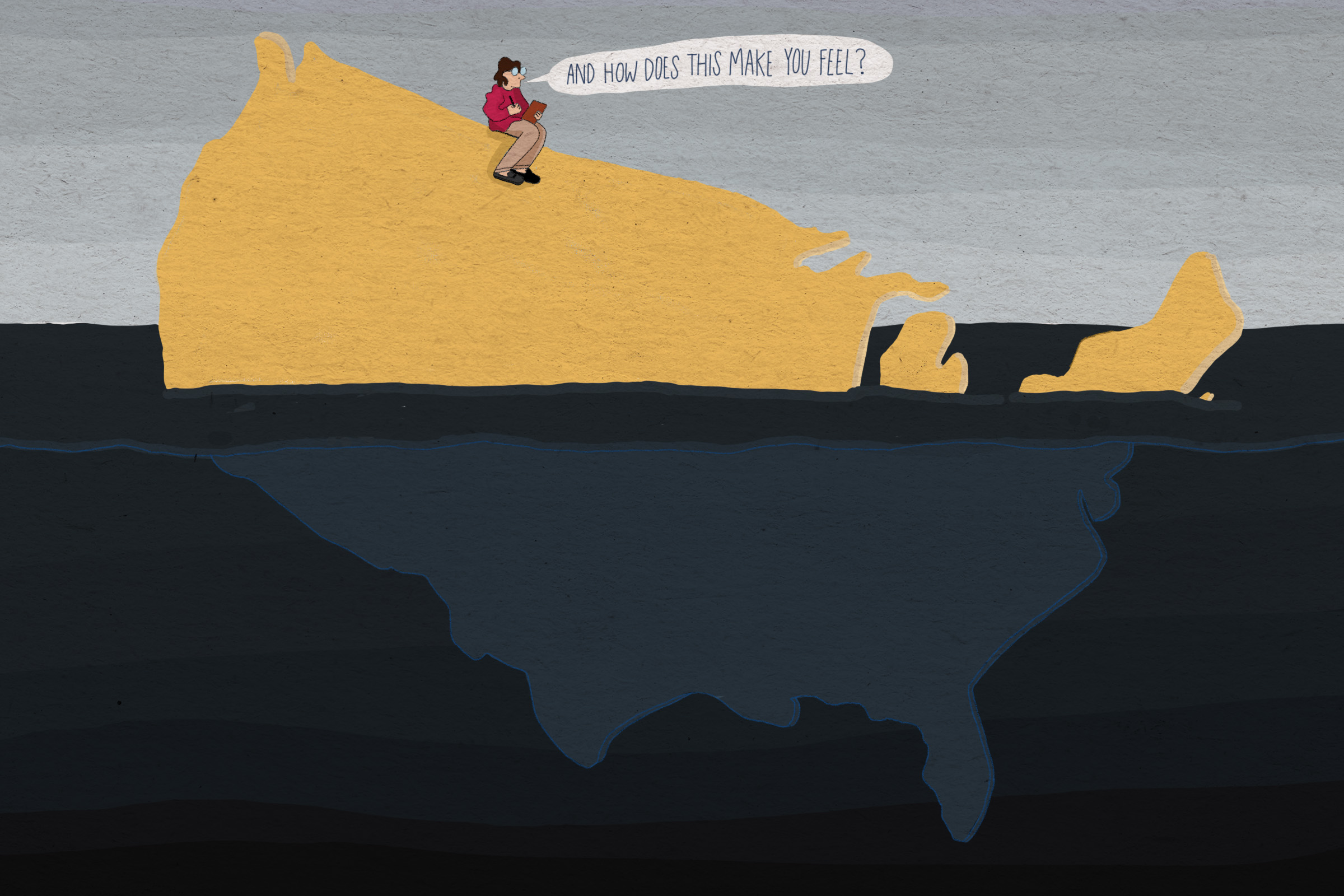It’s seldom covered in any decent capacity by most work or private health insurance unless you target it directly and lose out on other options.
Most offices are corner cutting so hard that the following week, you might have a new therapist/counselor that has no frame of reference beyond the former’s patient folder on you.
A lot of therapy is just a gotcha for Christian and religious bullshit.
Therapy and mental health is often seen as a sign of weakness for men, who often times never open up or seek help to begin with due to the stigma.
This isn’t a huge conundrum. It’s pretty easy to understand.
That and therapy is treating the symptoms but not the underlying cause. Therapy can help you heal, but when every week brings a new trauma you’re just treading water.
That and therapy is treating the symptoms but not the underlying cause.
As a therapist, I have to object and say that’s not good therapy. Even when the underlying cause is something external to yourself that you do not have control over, a competent therapist should be working with you on how you can minimize contact, manage contact better, or completely escape said external stressor. A complete fix may not be possible, but there’s usually room for improvement.
Regardless, it’s incorrect to say therapy treats symptoms, but not underlying cases. Underlying causes are focused on all the time.
Can you help me escape politicians who are taking away the ability for women to have safe abortions, attempt to overthrow the government, and their voters who brag about it by flying fascist flags on their cars? What about massive inflation without a similar rise in income that is needed just to survive?
Thanks in advance.
Yes this is snarky, but the stressors that most people are talking about in this thread are completely out of their control AND things they can’t just avoid.
Yeah, with the state of things right now, I’m not sure anxiety is so much a bug but a feature. The vast majority of the population is being exploited or ignored while a small group of people plunder the world’s resources and talents and continue to do so despite it obviously threatening the balance that life on this planet currently depends on. And different factions of those assholes use some of the population to try to take or protect what they have from others and have enough weaponry to devastate the entire population.
Even if it can be consciously ignored, the subconscious will figure it out and try to warn us and I think that denial is one of the big causes of mental health issues.
Can you help me escape politicians who are taking away the ability for women to have safe abortions, attempt to overthrow the government, and their voters who brag about it by flying fascist flags on their cars? What about massive inflation without a similar rise in income that is needed just to survive?
Nope, that’s going to take a lot of work to do anything about. What (imo) your therapist should be helping you do is develop strategies that let you deal with your anxieties. If therapy was only for dealing with things after the fact I don’t think I would be doing it because I agree with you, we can’t escape all the awful shit in the world but what we can do is make it not so debilitating that you can’t do anything.
So a therapist can help a woman in Texas get an abortion and overcome inflation?
Great to hear!
I’m confused, I thought I was pretty clear that therapy isn’t going to fix any of the societal issues that give you anxiety, it’s not supposed to…
The original point was that therapy doesn’t address the underlying problem. It led to the post above:
If therapy was only for dealing with things after the fact I don’t think I would be doing it because I agree with you, we can’t escape all the awful shit in the world but what we can do is make it not so debilitating that you can’t do anything.
Which doesn’t address the underlying issues or solve anything when it comes to actual problems that directly impact people. It is also worded as if the therapy helps by avoiding the awful shit so someone can do something. Which probably means not letting stress about one thing keep you from doing something else you can control, but in the context of the comment it was replying to could be read as doing something about the examples.
Therapy is great for addressing personal issues such as anxiety and trauma that are keeping someone from successfully acting on things they do have control over. But when it comes to things people can’t control it is just a coping mechanism that doesn’t solve the underlying problems that someone is reasonably responding to with frustration and helplessness. Yet it keeps being suggested as a solution.
Something that has always helped me with things like this (I’m trans in the uk, and have various other things around decentralised networks and such, also the economy and like 5000 other things, personal situations, etc.) is doing concrete steps towards my socio-techno-politico-economic goals and personal stuff.
Things like organising with other people (not just for protests/riots, but also things like underground services, discreet information leaflets, and just general community), trying to develop new tech, etc. ^.^
Decent therapy can help at least with dealing with some of the effects of this stuff, and manage interpersonal causes of mental health issues, in theory, if you can access it - though there are many issues imo with certain types of therapy that promote accepting shitty sociopolitical situations and personal situations, though this seems to be more of a philosophy thing than really therapy related specifically.
Techniques for managing the effects of poor sociopolitical situations - and working with someone to come up with more strategies to deal with these effects as well as avoid more common self-destructive thought patterns - might help you act more towards fighting the root causes even if it can’t solve them itself ^.^
For people in these situations, if you want someone else to help come up with personal coping strategies and to practise identifying more destructive thought patterns and manage emotional states, my opinion is that this is where a good therapist may be helpful if you can access one and want one.
For solving the more underlying issues? They probably can’t help directly, but they may help you gain more ability/mental bandwidth to deal with them either personally or via organising and political strategy. However this is all very conditional on therapist quality and some therapists may be actively harmful.
At least, this is my view. I have a pretty complex set of thoughts about therapy and mental health systems - and am familiar with the ways they can be used as weapons against individuals and larger groups as a trans and autistic person, as well as how they can be helpful - but hopefully the stuff about acting to do political things is useful to someone.
Actually doing something rather than just watching things get worse is helpful for me personally at least ^.^
If I was your therapist, while I couldn’t change the world for you, I could certainly help you change how you’re thinking about all of this political shit to reduce your stress and distress. Most of us have political misgivings, but only some of us have those misgivings create serious problems in our lives. I’m obviously sympathetic to—for example—women who can’t get abortions in their state, but therapy is about coping with reality, not changing reality in ways that correspond to wishful thinking.
I think the issue being remarked on is while yes therapy helps one better manage and attempt to do everything within an individual’s power to react to something (include minimizing contact) there are enough stressors beyond people’s individual locus of control that no matter how personally resilient one becomes misery is still a natural outcome. Therapy attempts to address underlying causes… But ultimately it still places the burden of fortitude on the person. If the situation merits more fortitude than person is capable of even at their best then the solution lies beyond that individual’s training to respond to it and must be addressed at the source. Hence the phrase “Treats symptoms, not the cause” is catch-phrasy and not by all means technically correct, but encapsulates this frustration at having to constantly be the one expected to exert constant personal effort to be okay while the source problems, which are often cultural/social in nature, are treated as immovable constants and continue being a source of inhumane conditions.
Therapy can help you heal, but when every week brings a new trauma you’re just treading water.
Damn, that’s… depressingly poignant
That and mental health awareness becoming more prevalent means that more people are becoming aware of mental health issues
Spoken like someone who’s never been in therapy.

Enough of them can.
deleted by creator
So it turns you into a Red Guard? :o
C’mon now, we can’t ALL be drug dealers
My therapist asked me about what stresses me out the most. I said “rent doubled”. She said, “Yeah there’s no therapy for that.” Then we chuckled and sighed deeply while we looked for something more lighthearted to talk about, like my father’s disappointment at me.
Our mental health is getting worse because life on this planet is getting worse. It’s not rocket science.
Without reading the article I’m gonna guess that it’s because work, politics and culture have got you all so permanently stressed and anxious that you turn on each at the slightest upset like sharks scenting blood.
We live in a world that rewards narcissistic asshole behavior and nothing else. It’s fucking depressing no amount of therapy will change that.
But some drugs might help you change your brain chemistry to be as narcissistic or just so singular focused that you can’t think about being depressed because you are focused on repetitive task work.
And isn’t that the fix that we all need?
Alternate reading of the headline: “We’re using more bandages than ever- why are people still getting cuts?”
If your boat is on fire. And has been for a while. And you start throwing water on it - but at the same time someones at the top of the boat are actively throwing gasoline everywhere - you aren’t going to put out the fire.
Is our mental health getting worse, or are we more aware of mental health issues? The article mentions how more people seek therapy now than 20 years ago and how more people are reporting their mental health as not good. However, I wonder how many people back then had mental health issues that they suffered in silence with. There used to be more of a stigma with having mental health disorders which led to people not seeking treatments (which of course led to less diagnoses). Someone with anxiety or depression would live with it or chalk it up to a character flaw or might think that what they’re dealing with was what everyone dealt with, but they probably wouldn’t seek therapy or tell anyone that their mental health is poor. So I do think that part of it is people acknowledging their struggles with mental health more now than ever.
I think this is a big factor in the uptick of MH cases being reported. It’s more okay to seek out help, so it gets reported more. The cases were still there 20 years ago.
When the military started to crack down on sexual assault and made it more “friendly” to report being a victim the number of cases reported went up. The cases where always there. Now we have a better idea of what we didn’t know before.
It’s the same thing with more lgbqt+ people. They’ve always existed, but since it’s more and more acceptable to come out more people are comfortable than ever before, despite the right screaming that kids are being “indoctrinated”.
I’ll choose “every politician is a lying grifter” for $500, Alex.
It’s an interesting article and worth a full read. But I’ll bullet point the main problems with mental healthcare it describes (based on my comprehension of the article):
- Over and misdiagnosis - since mental health disorders are based on symptoms which often overlap with other conditions, misdiagnosis is common. Also, diagnosis is inherently subjective and depends on the therapists impressions and the quality of information the patient gives
- Therapy itself doesn’t work for everyone, and when it does it often takes a lot of time. People expect to head into one or two therapy sessions and have all their problems solved. Also, some forms of therapy have less evidence of effectiveness.
- Since therapy is hard, time consuming, and costly, therapists often resort to prescribing meds. Antidepressants in particular are far less effective than people perceive. At best antidepressants can slightly help improve your mood, but the hard work of therapy is needed to address the underlying issues, which often doesn’t happen.
- What often has the biggest benefits are strategies that help people manage the stressors, habits, and circumstances of their lives. Traditional therapy often isn’t geared toward that, and there is only so much any therapy can do because…
- A lot of our mental health is based on societal factors and our circumstances, and you can’t just talk your way out living with all of this gestures vaguely at everything
- The rise of app based mental healthcare is good in that it expanda access, but the quality is shit.
and you can’t just talk your way out living with all of this gestures vaguely at everything
Chad analysis
The rise of app based mental healthcare is good in that it expanda access, but the quality is shit.
Careful peeps, they leak data too… which could cause a lot of mental health stressors. So got to keep that in mind when dealing unreliable tech merchants or really any of them.
It’s pretty simple…the people that really need mental health services can’t afford it.
Antidepressants aren’t cheap if you’re on the designer drugs…and they’re the first ones recommend by most doctors.
It’s because it begins very young. I’ve seen my friend hit her SIX MONTH OLD because they reached out to grab glasses that she puts in front of her. To train up a child? some bullshit religious “child training” program is often used in religious communities.
More frequent parental punitive discipline was significantly associated with smaller dorsal striatal volume in children, consistent with research demonstrating striatal differences following exposure to severe early life stress. Moreover, these results are consistent with a growing body of research linking normative variation in parental care with children’s brain structure. They align more specifically with recent work linking negative parenting (e.g., aggressive behavior, hostility) with reward processing neuroanatomy in adolescents and frontal-striatal functional connectivity in children.
Smaller dorsal striatal volume was significantly associated with higher depressive symptoms in children, consistent with previous work that has mainly focused on MDD in adolescents or adults. Thus, this study extends previous work by showing similar associations in a community sample of children who did not have psychiatric diagnoses. These findings suggest that changes in striatal morphology may precede the onset of MDD, [Major depressive disorder] which typically occurs in adolescence or adulthood
Parental Punitive Discipline and Children’s Depressive Symptoms: Associations with Striatal Volume
People are literally damaging their children’s brain by using punitive discipline / stressors.
“I got spanked and I’m ok” just is not true.
People were far more abusive to their kids in the past, so that doesn’t really explain why depression is getting worse now.
Because they were depressed and had a litany of other issues. Since it was taboo to talk about (and confront) those issues they developed fucked up coping mechanisms. Like hitting their kids/spouse. Explosive tempers, or just being an asshole. Drinking, gambling, cheating, etc.
Two of my grandparents were hardcore alcoholics that drank themselves to death after attempting suicide multiple times (which I only heard about as an adult). The third succeeded in hanging themself. The fourth lived to old age and was one of the nastiest, most narcissistic people I’ve met.
Sure, so then why are mental health issues appearing to get worse, despite the fact that people were so depressed they beat their kids all the time in the past?
Simple, we’re just better at diagnosing and treating it now, and people are more comfortable admitting to it now.
We’re not worse mental health wise, we’re a hell of a lot better than in the past. People are just more willing to talk about it now, and not try to have a stiff upper lip like with past generations.
Actually that makes sense. studies show epigenetic gene expression and its connections to depression. Conflicts like world war 2, that happened 80 years ago could be affecting us today. Abuse our parents, grandparents, great grandparents had to deal with could be the reason why we are more depressed.
I come from a family who lived in okinawa in 1945, my grandparents was part of children who were made to fight/work by the japanese imperial navy. They came here to the US for a better life. It was better but that didn’t change the fact that my grandparents went through that.
My entire family (3 generations) suffers from depression. My kids have never been abused so they don’t have depression but they are one stressful event away from being depressed.
We’re not more depressed now, we’re just more open about it and seeking help. Sure out grandparents had a rough go of it, but so did their parents, and their paretns parents, and on and on throughout history.
Before World War 2, you had the Great Depression. Before that World War 1 and the Spanish Flu. Before that you had colonialism, slavery, and horrific working conditions. Before that you had the black death. Before that you had less than a 50% chance of reaching adulthood.
People were definitely more depressed in the past, they were just shamed into having a stiff upper lip and not talking about it.
Back then everyone smoked 100 cigarettes everyday.
deleted by creator















